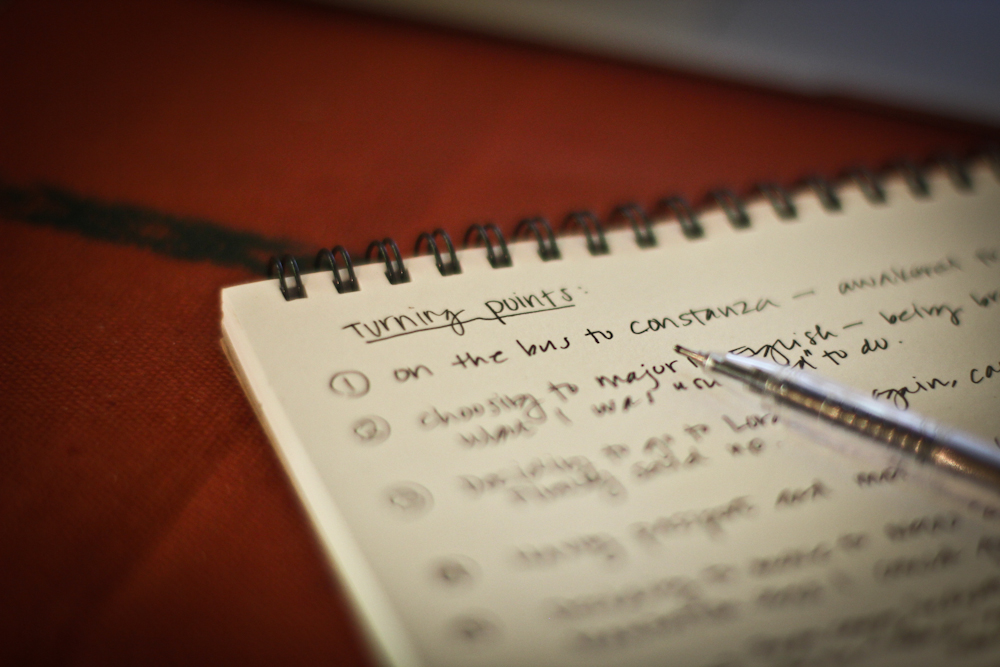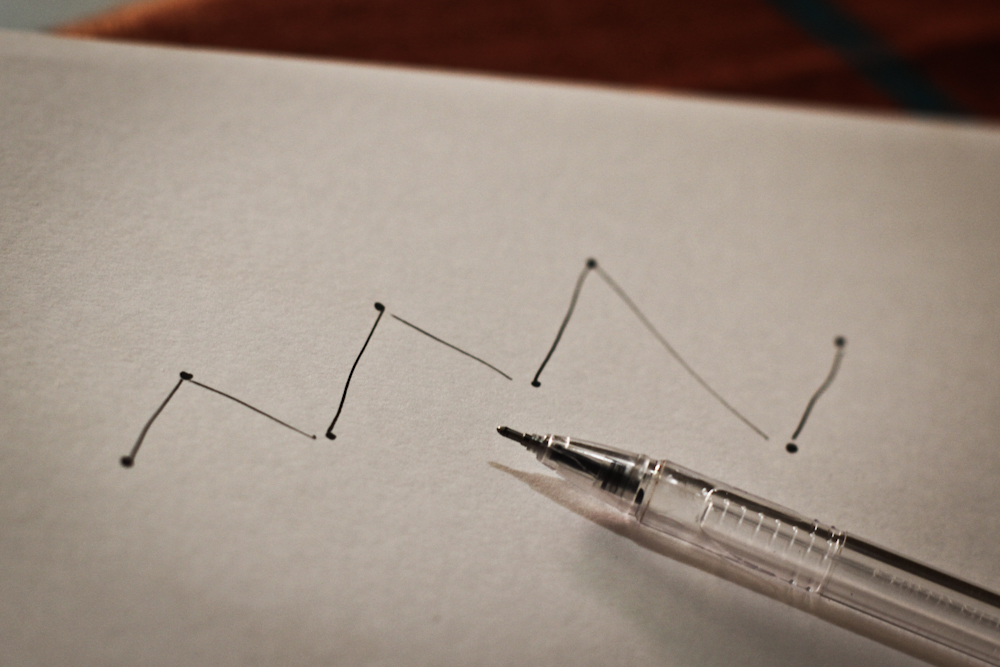“Memoir begins not with event but with the intuition of meaning — with the mysterious fact that life can sometimes step free from the chaos of contingency and become story.”
– Sven Birkerts
This weekend, I finished my book proposal – something I quite frankly could not be any more relieved about.
It was my third time putting the proposal together (and third time seriously better be a charm in this case), and each time it has been about as fun as my dad saying, “Kids, time to clean out the garage,” when we were young. Translation: It isn’t something I particularly look forward to.
I’ve found it requires a different part of your brain – not the fun writerly part that concerns itself with creating prose so pretty “you wanna roll around in it,” as my friend Kim so perfectly put it the other day. Rather, it’s all about wrangling the many parts of your book into a whole.
You have to convince the agent (and subsequently the publisher) that there’s a story here worth telling – and a story worth selling.
You have to know where the story is going, which means putting a chapter outline together – a delightful little section of the proposal that I would rather floss my teeth while doing sit-ups than write.
You have to know the peaks and valleys – and if you haven’t walked them yet (i.e. written that chapter), it’s hard to forecast the terrain before you get there.
I was reminded of all this over the weekend, as I kicked and screamed my way through each chapter summary. But at precisely 3:01pm on Sunday afternoon, I finished the last one, and thus the entire proposal – and celebrated by promptly throwing myself into the Arabian Sea.
And it was while I was basking in the late afternoon sun that I admitted I’d actually learned a few things during a process I claim to loathe so much – a few things I’d like to share with you, in case they’re of some use for your own book, either now or in the future.
As I bring mine to completion over the next few months, I’d really love to be transparent about it with you here – to hopefully gather a few posts together that might be a resource for fellow writers, so that we’re all kicking and screaming our way to publication together.
Here’s what I got:
1. It’s all about the story.
Two weeks ago I read a novel called Room in some six hours, it was that compelling. Never mind that it was 400 pages long, never mind that I had other work to do – I could not bring myself to do absolutely anything else until I knew how the story ended.
And as I felt myself being sucked into this vortex of a good story (and loving every minute of it), I thought – if only I could write a travel memoir this gripping. So I started reading some that are, in their own way, such as Cheryl Strayed’s wilderness memoir called Wild: From Lost to Found on the Pacific Crest Trail.
I started paying attention to where my attention peaked and waned in the narrative; for instance, how even the slightest romantic interest – even if it never pans out to much of anything – keeps you turning the pages.
I realized I could do a better job of telling my story, that there were places where I could amp up the tension and create a bit more mystery – and it was this realization that brought on the crisis I wrote about in my last post, the one where I stared at my computer screen last weekend and screamed, “This isn’t working!!!”
If I was boring myself with my own story, something had to change.
2. Make a list of 10-15 turning points.
 I realized I needed help, that I had been focusing too much on the poetry of the prose and not enough on the actual plot of the book – you know, the thing that keeps you turning the page. So I turned to Google, who in turn led me to this piece by Nina Amir – “Plot, Structure, and Theme in Your Memoir.”
I realized I needed help, that I had been focusing too much on the poetry of the prose and not enough on the actual plot of the book – you know, the thing that keeps you turning the page. So I turned to Google, who in turn led me to this piece by Nina Amir – “Plot, Structure, and Theme in Your Memoir.”
Here’s what she had to say:
“Dramatic structure, the narrative arc, is a mythic structure, a deeply satisfying resolution that fits with our need to create pattern and perspective in the midst of chaos of real life. That is why memoir is so challenging—we are trying to create story out of chaos, to make sense of the irrational and nonsensical impulses that drive all human beings. When you lift your own significant plot moments out of the confusion, you will have the basic spine of your story.”
What helped me the most was an exercise – making a list of my 10-15 turning points, or as Nina puts it, the “most significant moments that turned your life path from one direction to another.” As my memoir is focused on these last five years on the road, I didn’t start from birth, like Nina suggests, but during college. And that’s when a pattern began to emerge:
- Deciding to major in English.
- Deciding to go to London.
- Deciding to move to New Zealand.
- Deciding to move back to India.
There were a few turning points in between these, of course, but I was struck by how many times the word “decide” appeared on my list. I realized that the actual events themselves weren’t the turning points but the decisions that preceded each event.
This revelation led me to one of the new main themes of my book – making decisions for our dreams – and I would never have got there without this exercise.
3. Choose your 8 essential plot points.
During my masters course in London, we had a visiting lecturer named Mark Barrowcliffe. One of the things I most remember from our sessions with Mark was him saying that [almost] every screenplay has the same structure, with the same five key turning points and the same rising and falling action.
I decided to employ this structure in my memoir. Who knows where my notes are from Mark’s lecture, but I found an article that refreshed my memory – “How to Write a Script Outline: The 8 Major Plot Points.” (Another helpful one I read, “The five key turning points of all successful scripts,” terms these differently but essentially lists the same stages):
1. Opening and Closing Images
2. Inciting Incident
3. First Act Break
4. The Midpoint
5. The Point of Commitment
6. All Is Lost
7. The Climax
8. The Resolution
What happened next was like that exercise from elementary school, where you had two columns of lists and you had to draw lines connecting the corresponding pairs together. So yet again, I lined up my list of 10-15 turning points and then simply figured out where they fit into the above screenplay structure.
Which wasn’t so simple, really, but what finally emerged was an actual plot – I had a story!
So while I will always delight in the words themselves, what carried me through writing my book proposal all weekend was knowing I now have a structure for my story, too – something to hold all those words together.
Even in a memoir, it’s about the poetry and the plot.




People always say, “Just write. Don’t worry about anything else, just write.” But the truth is, there’s a lot more to it than that – proposals, outlines, all of that incredibly distressing-yet-necessary stuff that gets in the way of writing. I’ve been trying to write a memoir for 4 years, and always get roughly 60 pages in before deciding that it’s total crap and starting over. I realized a little while back that my problem is not doing what you’ve outlined in this post – breaking down the chapters, working out the turning points of the narrative, creating drama. It’s not enough to just put events on paper and assume it’s a story; you really have to edit your own life. Anyway, I wanted to say thank you for this post and good luck with your book! You have a beautiful writing style and I always enjoy reading your blog.
Hey Lauren, thanks so much for your comment and for sharing your thoughts! It’s great to hear them. I could not agree more with what you said about having to edit our own life – while we’re writing about our life, we also need to step back and look at it from an outsider’s perspective…how can we pull someone in who has no idea who we are? How can we make them care? Or, as a very blunt professor once told our class, “You need to make yourself interesting” 🙂
But yes, there is more to it than writing. I heard Susan Orlean speak at the Book Passage travel writing conference last August, and something she said stuck with me: “There’s a difference between writing and reporting.” Someone could be a wonderful writer, but if they’re not reporting – or in a memoirist’s case, if they’re not telling a story – then they need to keep working. Or as Chuck Wendig says here, “Understand the interplay between writing and storytelling. Those are two separate skills.” This past month for me has been a process of understanding good writing doesn’t necessarily make for a great book. There still needs to be a story running beneath the surface, hooking the reader in!
Lastly, I think everything you mention – proposals, outlines, etc – doesn’t quite get in the way of writing so much as it gives it a purpose. As much as I don’t enjoy working on the chapter outline, when I now sit down to keep writing my book, it’s going to be just a tiny bit easier or more fun because I know where this or that chapter needs to lead. I really hope this might be of some help to you with your memoir – and please feel free to email me ([email protected]) if you ever want to chat with someone about your ideas!
Thanks again for your comment and I look forward to seeing you here again 🙂
Thank you for sharing this! For years I have dreamt of writing a book but have never got around to it, kudos to you for living your dream. These tips are really useful and best of luck to you, can’t wait to read what you come up with! 🙂
Hey Ashley! Thanks so much for stopping by and saying hello 🙂 And thanks for your kind words as well, I’m really glad to hear the post is useful. PS – I was just checking out your blog…how cool that you’ve been an au pair three times in France. That was actually my dream job for after graduation – I look forward to following your adventures!
Congratulations on finishing your proposal Candace! Looking forward to reading your book when it’s published!
Thanks so much, Chris! It’s great to hear from you here. I hope 2013 has gotten off to a great start for you so far 🙂 Will you be at Book Passage again this year?
So looking forward to reading this! Writing a book has always been a goal of mind, and I have a feeling it may actually get started this year, even if I self-publish!
Thanks, Cat! And I look forward to reading yours as well – if you ever need a reader or someone to bounce ideas off of, feel free to let me know! I love working on books, especially travel memoirs, so if there’s any way I can help, I’d love to hear from you 🙂
This is one book I truly can’t wait to read, read again, and read yet again, as I always do with books I love deeply. Because I already know that is how I will feel about yours. I’m so excited for you my dear, congratulations, now go let your light shine xxx
You’re gonna make me cry, Hannah! Your support these last few weeks has meant the world to me – I can’t wait to share the book with you one day (and hopefully that’s one day soon!) xx
This is wonderfully helpful Candace. I can see you teaching a course on this at our writing retreat in Mexico 😉 XO
I’m so glad to hear that, Kim! And I love that idea – Mexico 2014…I can hardly wait 🙂
Candance I am so happy to have stumbled upon your blog and have loved your posts from Goa – I feel your sadness at leaving. Thank you for this very informative post – I am working – albeit very slowly – on a book idea and this has been invaluable. Can’t wait to read yours. Travel safe and love from Sydney x
Thank you so much, Francesca! It has been great chatting with you a bit on Facebook, and thanks for stopping by here as well 🙂 It will definitely be bittersweet to leave Goa tomorrow, but I am also excited to be getting back on the road. And I’m so glad to hear this post might be of some help as you work on your own book – and if there is anything else I can do (even if you’re just looking for someone to read the first chapter!) please let me know. Hope all is well in Sydney! x
I’ve nothing more to add, just wanted to let you know i’ve read this and enjoy it.
Thanks, Babu 🙂 I’m so glad to know you read it (and even more glad to know you enjoyed it!)
Candace,
I do not want to freak you out, but this article of yours has just made me fall in love with your intelligence. It has been more than a year since I have started content writing and now I am finally working on a travelogue.
I just stumbled upon your site through a series of top blogging websites, and something compelled me to take a look. The above piece is incredibly exceptional and very appropriate for any budding non-fiction writer.
Thanks a tonne for putting it here, very few share this kind of insight. Do get in touch when you come to India in the future. And please save a copy of your book with an autograph, for me.
Travel safe,
~Raj
Hello, Raj! Thanks so much for stopping by and getting in touch – it’s great to hear from you. I’m really glad to hear this piece will be helpful to you as you work on your own travelogue – and if there’s anything else I can possibly help with, please don’t hesitate to send me an email. Thanks again, and I look forward to seeing you again here!